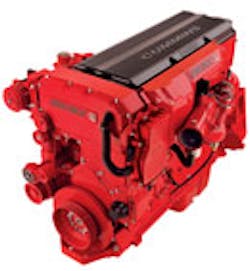Cummins has reaffirmed its intention to use selective catalytic reduction (SCR) to meet 2010 Environmental Protection Agency (EPA) regulations despite EPA’s contention that the copper zeolite used in its emissions system may produce carcinogenic dioxins that could lead the agency to not certify the system.
EPA said in a December 11th letter to U.S. engine manufacturers that it would do its own testing on engines with a SCR system that uses copper zeolite, and it could reject the engines even if the tests are inconclusive. All U.S. heavy engine markets except Navistar will use SCR to meet the EPA emissions mandates.
Cummins said it would use copper zeolite to meet the EPA regulations. According to Steve Charlton, vp of heavy-duty engineering for Cummins, copper zeolite has only recently become available for automotive applications. “Copper zeolite is very, very efficient at reducing NOx compared to other catalysts,” Charlton said in August.
(Continued)
“EPA has a long-standing concern that copper has the potential to catalyze dioxin formation in conditions experienced in incinerators and in diesel exhaust,” said Karl Simon, director of EPA’s Compliance and Innovative Strategies Division, in the letter written to engine manufacturers. “Questions have been raised regarding the potential for copper-containing diesel SCR catalysts to promote the formation of dioxin compounds.”
“Data from this plan, and any other relevant data EPA receives, will help determine how we will address this issue for future certification applications that include copper-zeolite catalysts,” the letter said. “For example, if the data are inconclusive or show increased dioxin emissions, then EPA likely will not certify an engine family utilizing such products unless a manufacturer can provide data which demonstrates the intended use of the copper catalyst doesn’t increase dioxin emissions.”
Cummins will offer a range of engines from the 6.7 liter ISB to 15 liter ISX. The ISX15, which will be introduced for 2010, will offer better fuel economy, stronger performance, faster throttle response and improved drivability and reliability, the OEM said, featuring the new Cummins XPI fuel system, cooled EGR system, advanced VGT turbocharger and an aftermarket system that incorporates SCR catalyst technology.
The company will also introduce the ISX11.9, a compact and lightweight medium-bore engine designed for vocational trucks and emergency vehicles, and its ISB6.7, ISC8.3 and ISL9 engines for 2010, the company said.
"Cummins 2010 engines will deliver what customers need in these challenging economic times", said Jim Kelly, president of Cummins’ engine business. "The engines are already being produced off our production lines for customer field tests. We're getting great feedback from our field tests, and our products, our people and our customer support are ready for 2010. In addition to the fuel economy gains associated with SCR and our XPI fuel system, the performance and reliability enhancements that come with decreased EGR rates are even greater than we estimated, and we're convinced now more than ever that SCR technology is the right technology for 2010."
